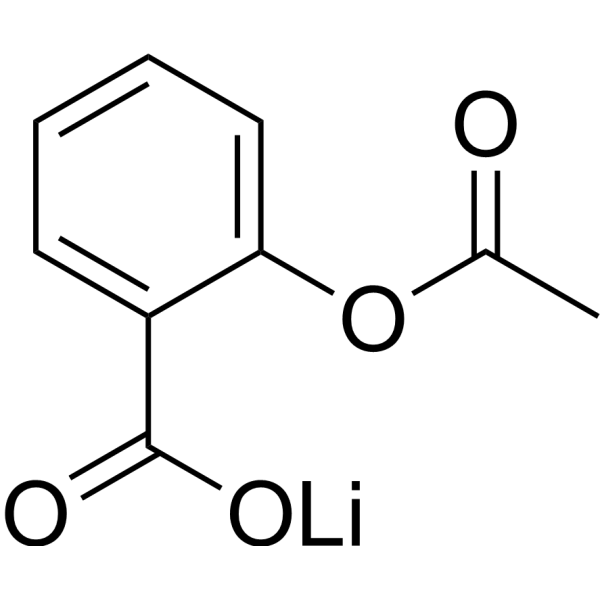产品
编 号:F758850
分子式:C9H7LiO4
分子量:186.09
分子式:C9H7LiO4
分子量:186.09
产品类型
规格
价格
是否有货
结构图

CAS No: 552-98-7
产品详情
生物活性:
Aspirin (Acetylsalicylic Acid) lithium is an orally active, potent and irreversible inhibitor of cyclooxygenase COX-1 and COX-2, with IC50 values of 5 and 210 μg/mL, respectively. Aspirin lithium induces apoptosis. Aspirin lithium inhibits the activation of NF-κB. Aspirin lithium also inhibits platelet prostaglandin synthetase, and can prevent coronary artery and cerebrovascular thrombosis.
体内研究:
Aspirin lithium (5-150 mg/kg, PO, once) shows significant antipyretic activity in adult yeast-fevered male rats.Animal Model:Male albino Charles River rats (200-250 g, 8 animals/group, fever was induced by 20 ml/kg of a 20 % aqueous suspension of brewer’s yeast which was injected SC in the back below the nape of the neck)
Dosage:5, 25, 50, 100 and 150 mg/kg
Administration:PO, once
Result:Produced a statistically significant decrease of 0.23 ℃ at 15 min post-drug at the dose of 150 mg/kg. Antipyretic effect gradually increased in magnitude until a peak effect of 1.96 ℃ was reached at 120 min post-drug. The ED50 of aspirin was found to be 10.3 mg/kg with confidence limits of 1.8-23.0 mg/kg. The antipyretic response to aspirin is dependent on the dose of the compound administered.
体外研究:
Aspirin lithium inhibits COX-1 and COX-2 in human articular chondrocytes, with IC50 values of 3.57 μM and 29.3 μM, respectively.Aspirin lithium acetylates serine-530 of COX-1, thereby blocking thromboxane A synthesis in platelets and reducing platelet aggregation. Aspirin lithium inhibits COX-2 protein expression through interference with binding of CCAAT/enhancer binding protein beta (C/EBPbeta) to its cognate site on COX-2 promoter/enhancer. Aspirin lithium inhibits NF-κB-dependent transcription from the lgκ enhancer and the human immunodeficiency virus (HIV) long terminal repeat (LTR) in transfected T cells. Aspirin lithium induces apoptosis by the activation of caspases, the activation of p38 MAP kinase, release of mitochondrial cytochrome c, and activation of the ceramide pathway.
Aspirin (Acetylsalicylic Acid) lithium is an orally active, potent and irreversible inhibitor of cyclooxygenase COX-1 and COX-2, with IC50 values of 5 and 210 μg/mL, respectively. Aspirin lithium induces apoptosis. Aspirin lithium inhibits the activation of NF-κB. Aspirin lithium also inhibits platelet prostaglandin synthetase, and can prevent coronary artery and cerebrovascular thrombosis.
体内研究:
Aspirin lithium (5-150 mg/kg, PO, once) shows significant antipyretic activity in adult yeast-fevered male rats.Animal Model:Male albino Charles River rats (200-250 g, 8 animals/group, fever was induced by 20 ml/kg of a 20 % aqueous suspension of brewer’s yeast which was injected SC in the back below the nape of the neck)
Dosage:5, 25, 50, 100 and 150 mg/kg
Administration:PO, once
Result:Produced a statistically significant decrease of 0.23 ℃ at 15 min post-drug at the dose of 150 mg/kg. Antipyretic effect gradually increased in magnitude until a peak effect of 1.96 ℃ was reached at 120 min post-drug. The ED50 of aspirin was found to be 10.3 mg/kg with confidence limits of 1.8-23.0 mg/kg. The antipyretic response to aspirin is dependent on the dose of the compound administered.
体外研究:
Aspirin lithium inhibits COX-1 and COX-2 in human articular chondrocytes, with IC50 values of 3.57 μM and 29.3 μM, respectively.Aspirin lithium acetylates serine-530 of COX-1, thereby blocking thromboxane A synthesis in platelets and reducing platelet aggregation. Aspirin lithium inhibits COX-2 protein expression through interference with binding of CCAAT/enhancer binding protein beta (C/EBPbeta) to its cognate site on COX-2 promoter/enhancer. Aspirin lithium inhibits NF-κB-dependent transcription from the lgκ enhancer and the human immunodeficiency virus (HIV) long terminal repeat (LTR) in transfected T cells. Aspirin lithium induces apoptosis by the activation of caspases, the activation of p38 MAP kinase, release of mitochondrial cytochrome c, and activation of the ceramide pathway.
产品资料

